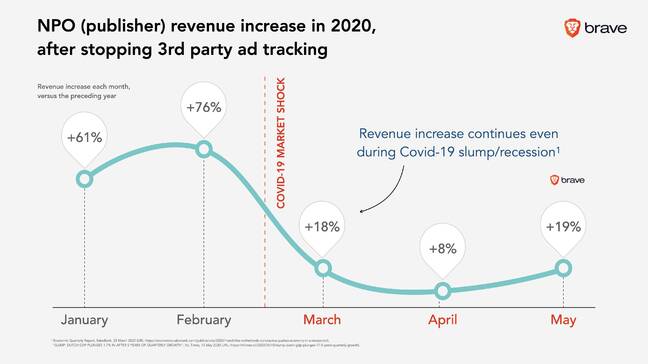Dutch National Broadcaster Saw Ad Revenue Rise When It Stopped Tracking Users. It's Meant To Work Like That, Right?

Johnny Ryan, chief policy officer at privacy-focused browser biz Brave, has reported on how ad revenue increased when Dutch national broadcaster NPO stopped running third-party trackers on its online video website.
From a marketing perspective, targeted advertising is supposedly a dream realised: why waste money showing ads to people who are not likely to become customers? The success of Facebook is based on the ability of advertisers to define an audience by location, age, sex, personal interests and more.
Per Google: "Targeting gives you the ability to show your ads to reach people with specific interests – namely, people who are interested in your products and services – and show them relevant ads."
Another idea is tracking the customer journey, from first seeing an ad to the final purchase. Great for marketing, but there are concerns about ad targeting based both on privacy and controversial matters like disinformation and manipulative political campaigns.

Dutch national broadcaster NPO saw ad revenue rise after stopping use of third-party trackers on its site
Ryan's report questions the core assumption that targeted adverting is more effective. "In January 2020, when NPO switched from tracking-based targeting to contextual targeting, revenue increased 61 per cent more than January 2019. In February, revenue increased 76 per cent over the previous year," he wrote.
Contextual targeting is the old-school approach of showing ads related to the content around them, such as displaying holiday advertising alongside travel features. Search engine DuckDuckGo relies on this, saying: "When you search on DuckDuckGo, we can show you an ad based on the keywords you type in. That's it."
The research is based on a report by STER (Stichting Ether Reclame), the company that manages advertising for NPO, which was presented at the Computer Privacy and Data Protection (CPDP) 2020 conference held in Brussels in January. The big question: how is it that contextual advertising can bring in more revenue for the publisher?
The answer may be more to do with the nature of the adtech industry than the effectiveness of the ads themselves. STER says that non-personalised ads are "just as effective", measured by number of clicks an ad attracts, though the click-through is not a complete analysis of effectiveness.
This is only one of several factors. The NPO was concerned about data protection regulations and whether its use of ad trackers was compliant. When NPO implemented "a new approach to consent that allowed people to reject 3rd party tracking, 90 per cent of their visitors did so,” said Ryan. Further, the popularity of blockers such as those recently adopted by Firefox is another issue, reducing the ability of advertisers to track users.
Perhaps the biggest factor is lack of transparency in the real-time bidding (RTB) market for online advertising. When targeted ads appear on sites like NPO, they cannot be bought directly from NPO (or STER) because the publisher lacks the data that drives the targeting. Instead they are bought via an agency, which takes a cut of the revenue.
How much is this cut? Ryan refers to a 2016 report in which The Guardian said that "a lot of the money that [advertisers] think they are giving to premium publishers is not actually getting to us."
In the worst case, only 30 per cent of the money paid by the advertiser reaches the publisher, according to the report. This means contextual advertising is potentially much more profitable for publishers, even if the ads themselves are somewhat less effective. According to Ryan, RTB "is a cancer eating the heart of legitimate media, and a business model for the bottom of the web."
The suggestion, therefore, is not so much that targeted advertising never works, but rather that a greedy adtech industry, along with the impact of privacy concerns, is giving publishers an incentive to return to plain old contextual advertising. ®
From Chip War To Cloud War: The Next Frontier In Global Tech Competition
The global chip war, characterized by intense competition among nations and corporations for supremacy in semiconductor ... Read more
The High Stakes Of Tech Regulation: Security Risks And Market Dynamics
The influence of tech giants in the global economy continues to grow, raising crucial questions about how to balance sec... Read more
The Tyranny Of Instagram Interiors: Why It's Time To Break Free From Algorithm-Driven Aesthetics
Instagram has become a dominant force in shaping interior design trends, offering a seemingly endless stream of inspirat... Read more
The Data Crunch In AI: Strategies For Sustainability
Exploring solutions to the imminent exhaustion of internet data for AI training.As the artificial intelligence (AI) indu... Read more
Google Abandons Four-Year Effort To Remove Cookies From Chrome Browser
After four years of dedicated effort, Google has decided to abandon its plan to remove third-party cookies from its Chro... Read more
LinkedIn Embraces AI And Gamification To Drive User Engagement And Revenue
In an effort to tackle slowing revenue growth and enhance user engagement, LinkedIn is turning to artificial intelligenc... Read more

